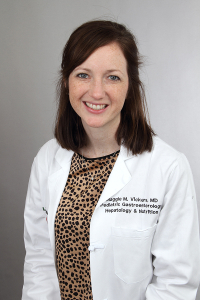Our fellowship program is designed to provide subspecialty residents in gastroenterology with the background and experience to diagnose and manage patients with acute and chronic diseases of the digestive system (esophagus, stomach, intestines, liver, and pancreas), including those that are life threatening, and to conduct research in this specialized field. Residents will be guided in developing clinical judgment and procedural skills and in acquiring medical knowledge, humanistic qualities, and professional attitudes and behaviors that are appropriate for the pediatric gastroenterologist.
The goals of this program include developing decision making skills in cost-effective, efficient evaluation and management of a wide variety of presenting complaints; to train and develop skills in appropriate laboratory testing, procedures including indications, preparation, techniques and interpretations; and provide mentoring and opportunities for clinical or laboratory based research.
Our clinical curriculum involves broadly based experience with a wide range of pediatric patients having gastrointestinal problems. The patient population is sufficiently varied and complex diseases and volume ensure that residents have the opportunity to become clinically competent in the management of common as well as uncommon gastrointestinal, hepatobiliary, and pancreatic diseases in patients ranging from infancy through young adulthood. A strength of our program is that the subspecialty residents have their own set of patients that they follow continuously in clinic with rotating attendings, rather than rotating through clinics and seeing the patients of attendings. They have ongoing responsibility for the continuing care of patients with chronic gastrointestinal problems and have opportunities to provide consultation on a wide variety of patients to become familiar with the gastrointestinal manifestations of a broad spectrum of pediatric illnesses.
Program Overview
-
The training component will include a core curriculum in the diagnosis, management and treatment of inpatients and outpatients with pediatric gastrointestinal, hepatic, pancreatic and nutritional disorders. The clinical procedural requirements are in alignment with North American Society for Pediatric Gastroenterology, Hepatology and Nutrition’s minimum recommendations for achieving competence, to include esophagogastroduodenoscopies (EGD’s), colonoscopies, liver biopsies, and exposure to other interventional procedures, i.e. sclerotherapy, banding, capsule endoscopy and transnasal endoscopy.
The implementation of the curriculum will be through mentoring; inpatient care and consultations using the family-centered care model; GI procedures; formal didactic teaching and directed reading and discussion. Fellows will spend at least two half days monthly for the entire 3-year period in an ambulatory care clinic in which both new and continuing care patients are seen. Because subspecialty patient care in pediatric gastroenterology is inherently multidisciplinary, fellows will have frequent opportunities to engage with other care providers consisting of; faculty, pediatric nurse practitioners (PNP’s), nurses, the GI Lab, dietitians, social services, office staff and ongoing interaction with other services such as cardiac/pediatric/neonatal intensive care units, Pediatric Surgery, Pathology, Interventional and Diagnostic Radiology services.
Breakdown of the 3-year fellowship
First Year
-
Emphasis: clinical (inpatient, outpatient clinical responsibility) with allotted time to participate in electives and develop a research project
-
Structure:
-
7 months Inpatient GI (14 weeks inpatient service/14 weeks consult service)
-
5 months Research
-
Procedure Focus Weeks (2 weeks of directed teaching at beginning of first year)
-
Outpatient exposure
-
Fellows Continuity clinic (2 half days monthly throughout the year)
-
-
Second Year
-
Emphasis: research and procedural skill development, along with ongoing clinical exposure in the inpatient/outpatient arenas
-
Structure:
-
4 months Inpatient GI (8 weeks inpatient service/8 weeks consult service)
-
8 months Research
-
Outpatient exposure
-
Fellows Continuity clinic (2 half days monthly throughout the year)
-
Electives (4 core subspecialty rotations, 3 months each, 2 half days/month)
-
-
Third Year
-
Emphasis: research and procedural skill development, along with ongoing clinical exposure in the inpatient/outpatient arenas
-
Structure:
-
2 months Inpatient GI (4 weeks inpatient service/4 weeks consult service)
-
10 months Research
-
Outpatient exposure
-
Fellows Continuity clinic (2 half days monthly throughout the year)
-
Electives (4 core subspecialty rotations, 3 months each, 2 half days/month)
-
-
-
-
Overview: The Pediatric Gastroenterology fellowship program subscribes to the guidelines established by the Accreditation Council for Graduate Medical Education (ACGME). Accordingly, fellows are expected to obtain competency in six core areas. These competencies are core to the practice of all physicians in autonomous practice and it is anticipated that faculty who interact with fellows, role model these core competencies.
Competency 1: Patient Care
Fellows must be able to provide patient care that is patient- and family-centered, compassionate, equitable, appropriate, and effective for the treatment of health problems and the promotion of health.
Fellows must be able to perform all medical, diagnostic, and surgical procedures considered essential for the area of practice.Competency 2: Medical Knowledge
Fellows must demonstrate knowledge of established and evolving biomedical, clinical, epidemiological, and social-behavioral sciences, including scientific inquiry, as well as the application of this knowledge to patient care.
Competency 3: Interpersonal Skills and Communication
Fellows must demonstrate interpersonal and communication skills that result in the effective exchange of information and collaboration with patients, their families, and health professionals.
Competency 4: Practice-based Learning and Improvement
Fellows must demonstrate the ability to investigate and evaluate their care of patients, to appraise and assimilate scientific evidence, and to continuously improve patient care based on constant self-evaluation and lifelong learning.
Competency 5: Professionalism
Fellows must demonstrate a commitment to professionalism and an adherence to ethical principles, including sensitivity to diversity.
Competency 6: Systems-based Practice
Fellows must demonstrate an awareness of and responsiveness to the larger context and system of health care, including the structural and social determinants of health, as well as the ability to call effectively on other resources to provide optimal health care.
-
Our clinical curriculum involves broadly based experience with a wide range of pediatric patients having gastrointestinal problems. The patient population is sufficiently varied with adequate volume to ensure that residents have the opportunity to become clinically competent in the management of common, as well as uncommon gastrointestinal, hepatobiliary, and pancreatic diseases.
One of the strengths of our program is fellows have their own set of patients they follow autonomously in their continuity clinic with attending supervision. This allows for improved continuity and patient ownership. They have ongoing responsibility for the continuing care of patients with chronic gastrointestinal problems and have opportunities to provide consultation on a wide variety of patients to become familiar with the gastrointestinal manifestations of a broad spectrum of pediatric illnesses.
Another strength of our program is the flexibility fellows have during fellowship to pursue various training tracts. In addition to the core requirements for fellowship training, fellows have the opportunity to gain exposure in various areas of interest, particularly during the second and third years of training. Some of these areas include global health, educational leadership, quality improvement and therapeutic endoscopy. As a program, we are dedicated to providing each fellow with the necessary tools to develop into a competent and effective provider, particularly in areas of interest to the fellow.Multidisciplinary patient centered programs:
-
Colorectal Program
-
Intensive Feeding Program
-
Pancreas Program
-
Polyposis/Cancer Predisposition Clinic
State of the art GI laboratory and endoscopy facilities perform number of diagnostic and therapeutic procedures, which include:
-
Upper and lower endoscopy with biopsies
-
Polypectomies
-
Variceal Sclerotherapy and Banding
-
Foreign body removal
-
Dilatations
-
Percutaneous liver biopsies
-
Ph/impedance study
-
Hydrogen Breath Testing
-
Anorectal Motility Testing
-
Esophageal manometry
-
Transnasal Endoscopy
-
EndoFLIP procedure
-
Impactful and effective teaching is a top priority within our fellowship program. The expectation is for teaching to occur daily through formal and informal activities. All faculty within the division of Pediatric Gastroenterology, Nutrition and Hepatology embrace the responsibility, understand the importance of working with fellows, and are committed to teaching in all circumstances.
Throughout fellowship training, fellows will have opportunities to receive instruction from faculty in the division in both the inpatient and outpatient setting. Supervised instruction during consultative services and communication with other physicians and other members of the healthcare team will occur. Additionally, fellows will have the opportunity to be both a student and teacher, as they will be involved in teaching residents and students rotating on inpatient services. Finally, fellows will have the opportunity to rotate through several multi-disciplinary, core clinics on elective months during second and third year. These include the Eosinophilic disorders clinic, Inflammatory Bowel Disease program, Aerodigestive Clinic, Intestinal Rehabilitation program, and Hepatology clinics.Teaching Faculty
-
Scholarly activity is a core requirement for fellowship programs according to the Accreditation Council for Graduate Medical Education (ACGME). During fellowship, all fellows are expected to engage in projects in which they develop and test hypotheses or in projects of substantive scholarly exploration and analysis that require critical thinking. Fellows will learn basic research principles in which to develop a project, follow it through completion, and prepare the project for publication and presentation. Areas in which fellows may pursue scholarly activity include, but are not limited to basic, clinical, or translational biomedicine; health services; quality improvement; bioethics; education; and public policy.
In order to accommodate a variety of fellow research interests, we provide educational resources to facilitate fellow involvement in scholarly activity. Accordingly, fellows will have opportunities for intra-and extra departmental research and collaboration. All fellows at the University of Alabama at Birmingham (UAB) will have access to the Center for Clinical and Translational Science and Pediatric Research Office to assist with research development and execution. Resources provided include assistance with IRB applications and statistical support. Additionally, fellows have the opportunity to participate in monthly Fellow Research Round Table sessions and division specific monthly sessions discussing research tools. Finally, interested fellows may also pursue advanced degrees in public health offered at UAB.Division Research Activities
Faculty:
-
Cohort Study of Disease Education and Medication Adherence in patients attending a specialized Pediatric Inflammatory Bowel Disease Clinic
-
Development of a Pediatric IBD Biorepository of patient-derived intestinal 3D organoids.
-
Understanding how the sulfite metabolic pathway may be involved in intestinal epithelial dysregulation.
-
High throughput screening of environmental factors and potential therapies in IBD organoids to elucidate population and patient-specific responses.
-
Children with Sickle Cell Disease Hospitalized at Children’s hospitals with Acute Pancreatitis have a longer length of stay and require more procedures compared to those without sickle cell disease
-
Assess post procedural outcomes including abdominal pain and safety of carbon dioxide insufflation during pediatric ERCP/EUS: a randomized controlled trial.
Fellows:
-
Eosinophilic Esophagitis: Analyzing the Microbiome
-
Fluid and Nutrition Management and Length of Stay in Pediatric Acute Pancreatitis: A Systematic Review and Meta-Analysis
-
Clinical Aspects Influencing Hospital Length of Stay in Pediatric Acute Pancreatitis
-
Evaluating the morbidity and mortality between ultra-short bowel and short bowel patients during the early stages of intestinal rehabilitation
-
-
In concordance with the ACGME, fellows “must participate as team members in real and/or simulated interprofessional clinical patient safety and quality improvement activities, such as root cause analyses or other activities that include analysis, as well as formulation and implementation of actions.”
Our fellowship program prioritizes participation in quality improvement activities during fellowship. Each fellow will have the opportunity to contribute to a quality improvement project either individually or as part of a group. Embedded in the division of pediatric gastroenterology, Hepatology and nutrition are faculty members with experience and formal training in quality improvement. They serve as mentors and coaches for all fellow-driven quality improvement projects.
Additionally, there are formal avenues to obtain additional training in the field of quality improvement. They include the certificate and masters programs through the School of Health Professions at UAB.Current Division QI Projects
-
Improving acute pancreatitis at Children's of Alabama through creation of order set and clinical care guideline
-
Improve diagnosis of acute pancreatitis in children and young adults with sickle cell disease presenting with abdominal pain to the ED
-
Improve the amount of feedback received from fellows GI clinic
-
A quality improvement around use of standard growth curves and improving its use in standard practice during clinic encounters/visits.
-
-
As a fellowship program, we place a strong emphasis on the delivery of quality educational activities during all years of training. Fellows will have protected time weekly to participate in various seminars designed to enhance their learning on all aspects of pediatric gastroenterology. Core seminars include our Pediatric GI Seminary series, pathology and radiology conferences, journal club and monthly board review series.
Current schedule of educational activitiesNutrition Seminar series
• Held every Tuesday from 12:00 – 1:00 p.m. (once yearly during August)Board Prep Review
• Held monthly – 3rd Tuesday from 12:00 – 1:00 p.m.Pathology Conference
• Held every Friday at 1:00 p.m.Pediatric GI Seminar Series
• Held every Friday at 2:00 p.m.GI Radiology Conference
• Quarterly -2nd Friday of every third month at 2:00 p.m.Combined GI/surgery conferences
• QuarterlyM&M’s
• Twice a yearResearch core curriculum
• Held monthly – 2nd Tuesday from 12:00 – 1:00 pm -
The Pediatric Gastroenterology Fellowship program considers the well-being of the fellows and faculty a top priority. In accordance with the University of Alabama at Birmingham and the ACGME, measures have been put in place to promote the physical, psychological and emotional well-being of fellows and faculty throughout fellowship. By promoting well-being, we aim to optimize the learning experience for trainees, enhance teaching effectiveness, and improve patient care. The following
Institution Level Wellness
-
Wellness Week
-
Graduate Medical Wellness Center (open 24/7 and offers a kitchen area with sink and refrigerator, seating lounge space, study zone, and a room designated for mothers with equipment for pumping and refrigeration)
-
Childcare Committee
-
Free counseling through UAB Employee Assistance & Counseling Center (EACC)
Department Level Wellness
-
Monthly wellness events hosted by the Pediatric Subspecialty Wellness (SWell) Committee (Examples of events: Birmingham Baron’s Baseball Game, Hand and Paw visits, Holiday Cookie Parties, Games, Fun photo booth, Friendsgiving Lunch, Crawfish Boil)
-
Pediatric Fellow Core Conference sessions: Fellow Wellness & Resilience Workshop, Vital talks
-
Pediatric Fellow Lounge: 24-hour access for fellows to rest, work on notes, grab a coffee
-
Lunch provided every Friday for Fellow Conferences/Roundtables
Division Level Wellness
-
Faculty mentor for wellness and career goals (separate from research mentor)
-
Wellness retreats for fellows during the year
-
The fellowship program director and associate program director meet with each fellow quarterly in one on one interviews to assess how the fellow is doing with a strong focus on their wellness activities, and to inquire how they can be helped if there is undue stress.
-
Flexible scheduling to allow for medical or dental appointments as needed.
-
Our Team

David Galloway, M.D.
dpgalloway@uabmc.edu
205-638-9918

Maggie Vickers, M.D.




